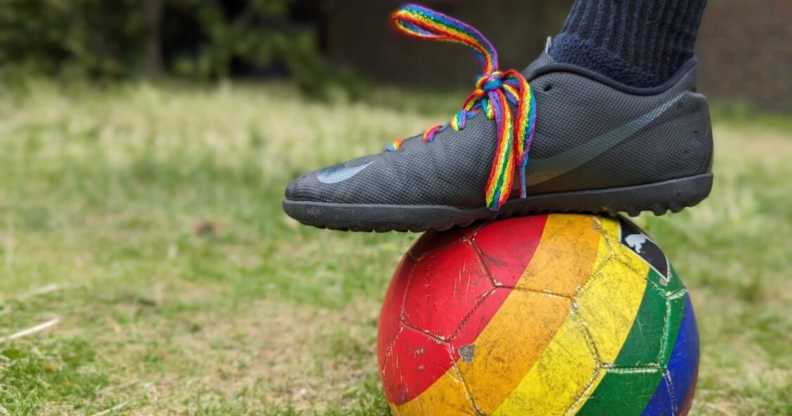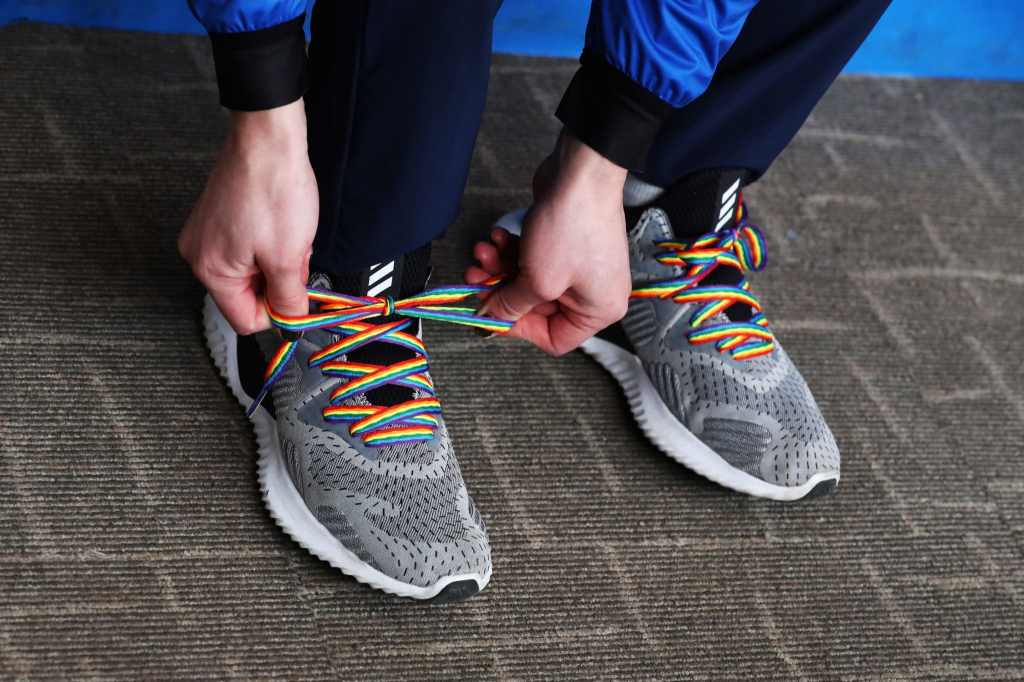Sports fans more welcoming of LGBTQ+ people than ever

Stonewall has marked 10 years of its Rainbow Laces campaign (Stonewall)
The attitudes of sports fans towards the LGBTQ+ community has changed dramatically, new research by Stonewall shows as it marks ten years of its Rainbow Laces campaign.
To celebrate and commemorate 10 years of the campaign Stonewall has released a special Glitter edition of its iconic Rainbow Laces, alongside three new identity-specific versions: Men Loving Men (MLM) Laces, Genderfluid Laces and Aro Laces.
The research commissioned by the LGBTQ+ charity, carried out by Walnut ICM, found Britons are increasingly embracing LGBTQ+ people in their sports communities.
The data shows 74 per cent of of the 12 million sport fans who saw the Rainbow Laces campaign in 2022 considered LGBTQ+ people as part of the sport community, an increase from 68 per cent the previous year. This was also compared to 58 per cent of sport fans who did not see the campaign.
Alongside this, more than three quarters (78 per cent) of respondents said they would not be embarrassed if their favourite player came out as gay and 60 per cent would be happy to play alongside a trans teammate.
There is still more work to do though, as the research shows.
Just over a fifth (21 per cent) of sports fans still said anti-LGBTQ+ comments are harmless and nearly a quarter (24 per cent) said they would not confront someone making homophobic comments at a sports event.
In terms of how welcoming sport is to LGBTQ+ athletes, 36 per cent of those surveyed said it is welcoming to lesbian and bisexual women, 33 per cent said it is welcoming to gay and bisexual men and just 23 per cent felt trans athletes are welcomed.

Michael Gunning, professional swimmer and Stonewall sports champion, said it has been “incredible” to the impact of the campaign on sport.
He said: “During that time, swimming, a sport I’ve dedicated my life too, has made major strides towards better supporting LGBTQ+ athletes, and we’re now seeing record amounts of out and proud queer athletes embracing their sexuality and feeling welcome in sport.
“Growing up, sport was sadly a hostile place for many LGBTQ+ people, and I often felt like I couldn’t be my true self.
“That’s why it’s been so inspiring to see the genuine changes that individuals and sporting organisations have made over the years, to make sport a welcoming space for everyone.”
He continued: “As the countdown begins to the Paris 2024 Olympic Games, eyes will be on sport now more than ever, but we cannot be complacent.
“Too many LGBTQ+ athletes still feel afraid to compete as their authentic selves. It’s essential that we all keep on fighting to make sport everyone’s game.”
Liz Ward, director of programmes at Stonewall, said: “When I first saw the Rainbow Laces campaign back in 2013, I didn’t realise football, the sport I love, cared about my existence, let alone believe I should be there. The power of visibility is wide reaching and affirmative.
“Today, things feel different. There are more openly LGBTQ+ sportspeople than ever before, and our data shows that the mood is turning in the stands, with nearly three-quarters of fans who have seen our campaign now considering LGBTQ+ people part of the sporting community.
“That’s an incredible turnaround – but, to lean on an old footballing cliché, we can’t sit back and defend our lead, as globally we have seen how quickly LGBTQ+ rights can backslide. We all need to do our part to make sport everyone’s game.”
Robbie de Santos, director of external affairs at Stonewall, said: “I’ve been working on the Rainbow Laces campaign for eight years and I think we can all rightfully be proud of the positive shift in attitudes towards LGBTQ+ people in sport. But there is still everything to play for.
“At all levels, from grassroots sports and the gym up to elite levels, there are are still many barriers that result in LGBTQ+ people shying away from participating, and if we want to truly make sport everyone’s game, we need to turn the Rainbow Lace from a symbol of inclusion into a mindset.”

